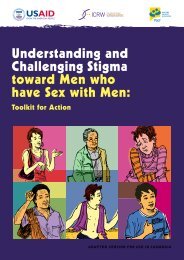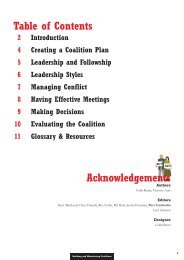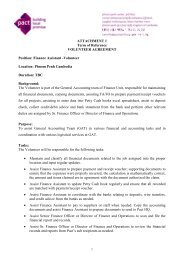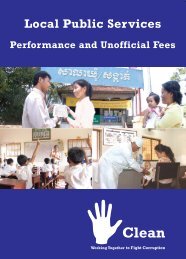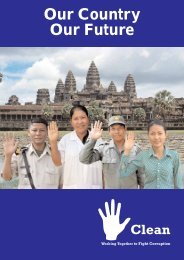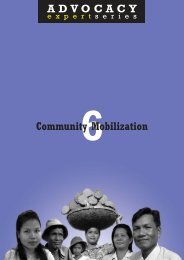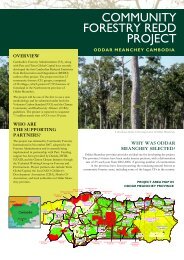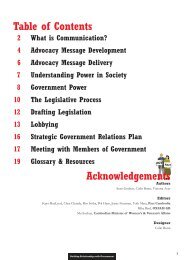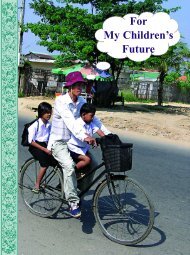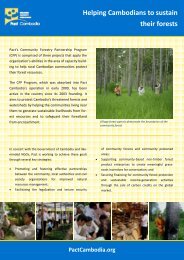Advocacy in Cambodia: Increasing Democratic ... - Pact Cambodia
Advocacy in Cambodia: Increasing Democratic ... - Pact Cambodia
Advocacy in Cambodia: Increasing Democratic ... - Pact Cambodia
You also want an ePaper? Increase the reach of your titles
YUMPU automatically turns print PDFs into web optimized ePapers that Google loves.
executive summary<br />
The <strong>Cambodia</strong>n non-profit movement is enter<strong>in</strong>g <strong>in</strong>to its second decade. Proponents of<br />
advocacy estimate that it is now an appropriate time to review past advocacy campaigns <strong>in</strong> order to<br />
identify successful strategies and mistakes that have been made <strong>in</strong> previous efforts’ design and<br />
implementation. This study is based on a review of advocacy activities <strong>in</strong> eight sectors: fisheries,<br />
land, labor, commune council elections, the women’s movement, urban poor, HIV/AIDS, and child<br />
rights. These sectors were chosen for their illustrative qualities and are not <strong>in</strong>tended to be<br />
representative of all advocacy <strong>in</strong> <strong>Cambodia</strong>.<br />
Outside of human rights issues, few advocacy activities were be<strong>in</strong>g conducted <strong>in</strong> <strong>Cambodia</strong><br />
prior to 1995. The <strong>Cambodia</strong>n context presents considerable challenges for civil society organizations,<br />
as advocacy relies on organiz<strong>in</strong>g groups to apply pressure on policy makers to affect and enforce<br />
change. Thus, the absence of rule of law and lack of popular representation at important<br />
adm<strong>in</strong>istrative levels <strong>in</strong> <strong>Cambodia</strong> significantly <strong>in</strong>hibits this process. In addition, <strong>Cambodia</strong> does<br />
not have a strong tradition of community-based organizations, and as such, advocacy NGOs have<br />
difficulty mobiliz<strong>in</strong>g popular support to legitimize larger advocacy campaigns. Even so, civil society<br />
has grown at a tremendous rate s<strong>in</strong>ce associations were allowed to start register<strong>in</strong>g with the<br />
government dur<strong>in</strong>g the UN adm<strong>in</strong>istration. NGOs <strong>in</strong> <strong>Cambodia</strong> today are allowed to operate for the<br />
most part without government h<strong>in</strong>drance.<br />
Though the advocacy movement is young and the advocacy context is challeng<strong>in</strong>g, current<br />
campaigns are utiliz<strong>in</strong>g several strategies to good effect. These <strong>in</strong>clude:<br />
· Document<strong>in</strong>g problems and dissem<strong>in</strong>at<strong>in</strong>g <strong>in</strong>formation;<br />
· Rais<strong>in</strong>g awareness;<br />
· Engag<strong>in</strong>g <strong>in</strong> organized action such as demonstrations and strikes;<br />
· Facilitat<strong>in</strong>g engagement with government officials through conferences, workshops, and<br />
other consultation processes;<br />
· Lobby<strong>in</strong>g high-level officials; and<br />
· Network<strong>in</strong>g.<br />
With<strong>in</strong> the <strong>Cambodia</strong>n context, areas of weakness <strong>in</strong>clude lack of efficiency and solidarity <strong>in</strong><br />
network<strong>in</strong>g, lack of grassroots participation <strong>in</strong> identify<strong>in</strong>g and implement<strong>in</strong>g advocacy agendas,<br />
and limited or nascent experience. This last factor has resulted <strong>in</strong> some missed opportunities, such<br />
as the failure of the first domestic violence campaign and the failure of community fisheries advocates<br />
to lobby at all levels of the legislative process.<br />
Of greater concern perhaps is the perception that NGOs rely too heavily on donor conditionality<br />
as a means of <strong>in</strong>fluenc<strong>in</strong>g policy. Critics po<strong>in</strong>t out that this strategy of rely<strong>in</strong>g on <strong>in</strong>ternational<br />
agencies to pressure government does not guarantee genu<strong>in</strong>e long-term changes. That be<strong>in</strong>g said,<br />
leverage provided by <strong>in</strong>ternational donors does create a protective environment <strong>in</strong> which civil society<br />
can strengthen and grow. The focus <strong>in</strong> the future will need to be on allow<strong>in</strong>g the advocacy movement<br />
<strong>in</strong> <strong>Cambodia</strong> to mature beyond dependence on <strong>in</strong>ternational agendas.<br />
NGOs have been able to provide considerable <strong>in</strong>put <strong>in</strong>to new and modified laws, sub-decrees,<br />
and other government policies. Although impact is difficult to assess, advocates are beg<strong>in</strong>n<strong>in</strong>g to<br />
assert the right of civil society organizations to engage <strong>in</strong> policy formulation. Issues that were once<br />
hidden are be<strong>in</strong>g brought out <strong>in</strong>to ma<strong>in</strong>stream society. For example, prior to 1994 there was no<br />
Khmer term for “domestic violence” and the word “corruption” was not openly used. Now however,<br />
the domestic violence problem is openly acknowledged and NGO leaders and ord<strong>in</strong>ary citizens dare<br />
to share their views about corruption <strong>in</strong> public. This demonstrates a significant, positive cumulative<br />
effect of the myriad advocacy and democracy activities that have taken place thus far.<br />
Major recommendations of this report relate to <strong>in</strong>creas<strong>in</strong>g transparency <strong>in</strong> policy formulation<br />
by mak<strong>in</strong>g public <strong>in</strong>formation public and establish<strong>in</strong>g standard guidel<strong>in</strong>es on the consultative process<br />
for all legislation. With<strong>in</strong> the civil society realm, advocacy objectives will be advanced if NGOs with<strong>in</strong><br />
each sector come together to establish common advocacy goals and if advocacy leaders from different<br />
sectors have a chance to exchange experiences. Other recommendations <strong>in</strong>clude <strong>in</strong>creas<strong>in</strong>g<br />
grassroots participation <strong>in</strong> agenda selection and policy formulation <strong>in</strong> order to make advocacy<br />
campaigns more susta<strong>in</strong>able, and explor<strong>in</strong>g new opportunities to <strong>in</strong>volve commune councils <strong>in</strong><br />
advocacy efforts, as a way of l<strong>in</strong>k<strong>in</strong>g government officials to the advocacy process.<br />
advocacy <strong>in</strong> cambodia: <strong>in</strong>creas<strong>in</strong>g democratic space




